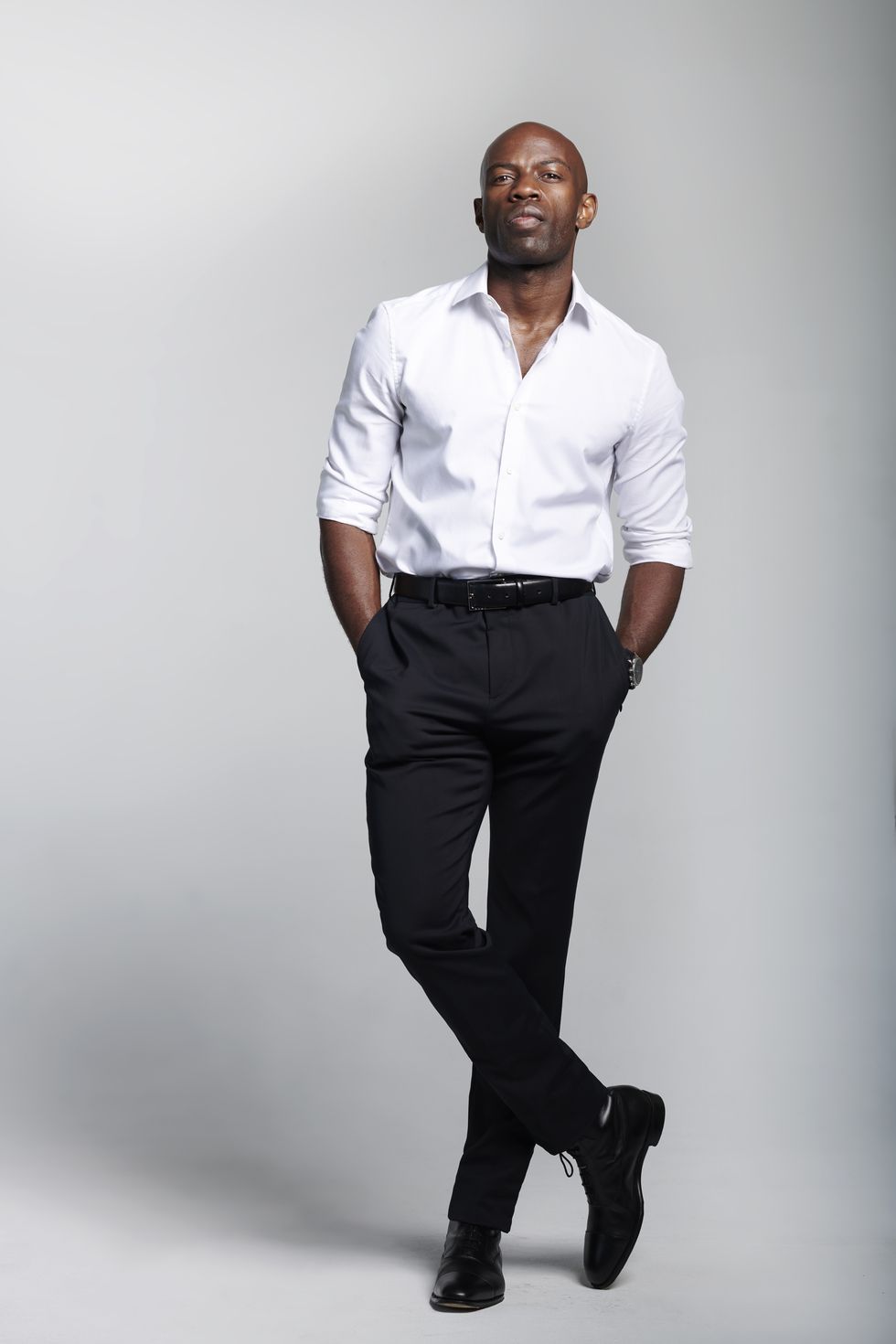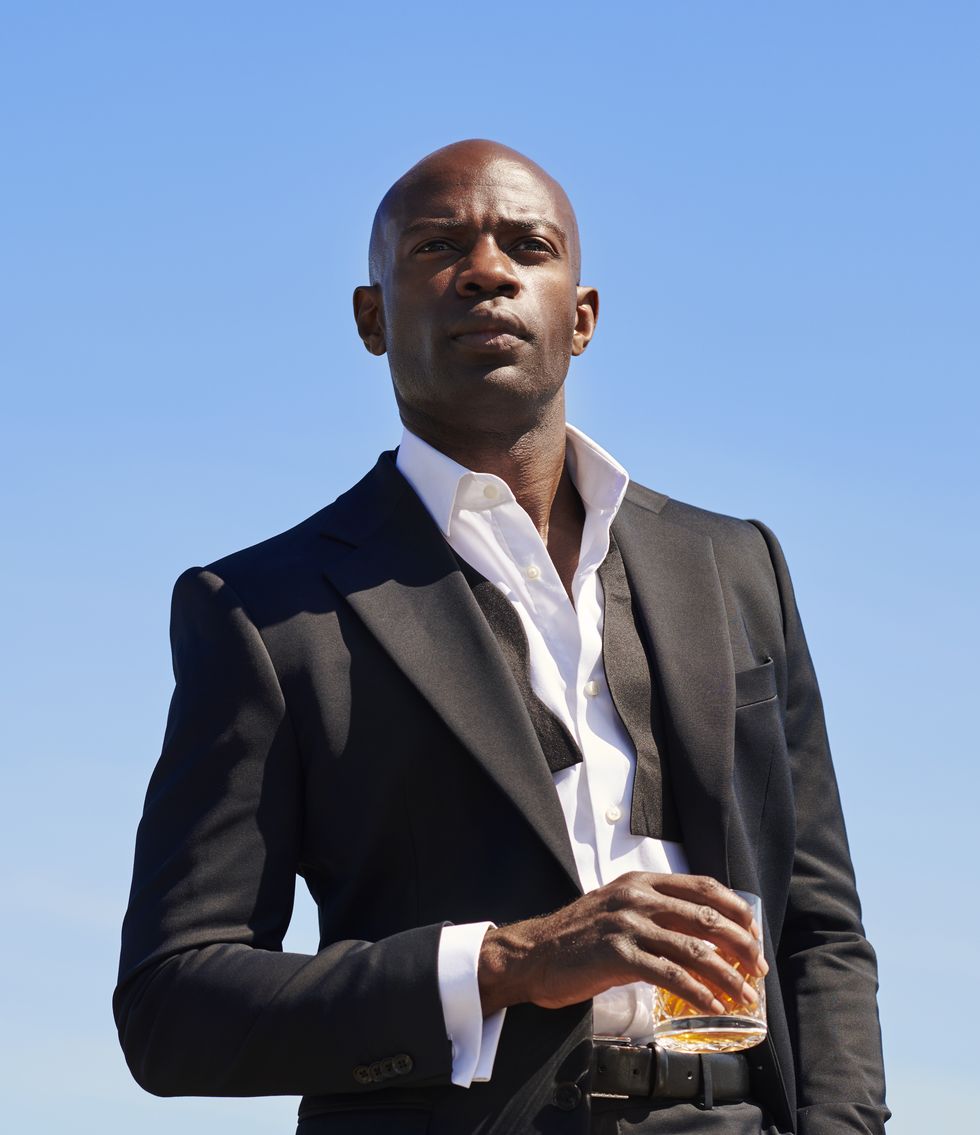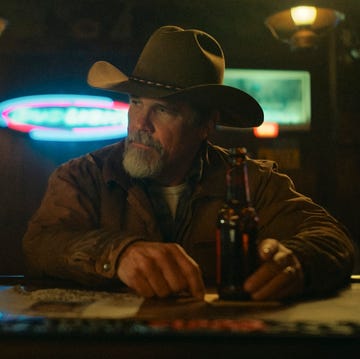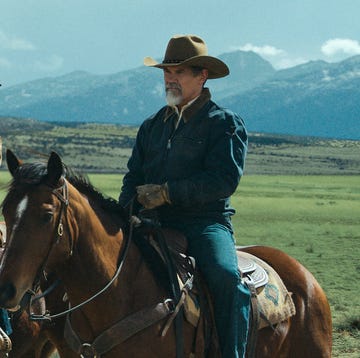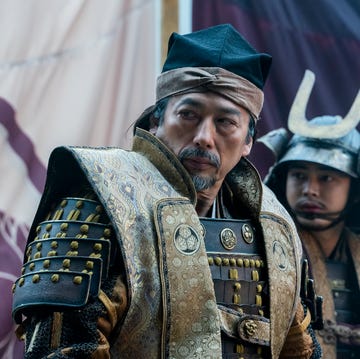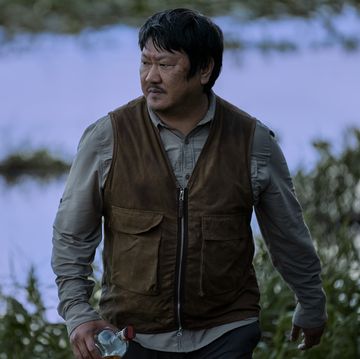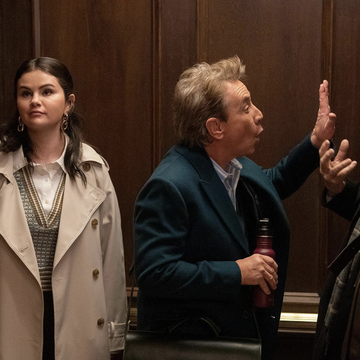David Gyasi is no stranger to wrangling a horrible boss. In The Diplomat, Netflix’s breakout political drama, the 43-year-old British actor stars as Austin Dennison. Amidst all the chaos, Dennison is the level-headed British foreign secretary who works for Prime Minister Nicol Trowbridge (Rory Kinnear). The man's job duties are split between facilitating foreign policy and cosplaying as an adult babysitter, as he navigates Trowbridge’s outlandish demands. It’d be a difficult job for anyone, fictional or not—but the key to success, as Gyasi explains, is managing up.
“I’m just thinking about when I used to work at Tesco’s,” Gyasi tells me over Zoom, calling in from his home in Buckinghamshire, a quaint town just outside of London. “We had a boss there who came, joined on my level, quickly became manager, and just switched overnight.” The actor began working at the British grocery store when he was 16, and stayed there until he scored acting gigs, like the swoon-worthy band-member in What A Girl Wants, at 23.
Along the way, he mastered working with difficult leadership. “Learning how to manage up as something I learned very early on,” he says, collecting himself after a bout of laughter. “I’m laughing because my best mate used to work there, he didn’t learn it, and actually walked out.” Gyasi doesn’t explain how that dramatic exchange played out—like Dennison, Gyasi is loyal and protective of his inner circle. Instead, with a knowing grin, he says, “It was quite hilarious the way he did it.”
It’s that elusive charm and level-headedness that makes Dennison a standout on The Diplomat. On the show, he mitigates conflict with ease, while simultaneously charming his new coworker—Kate Wyler (Keri Russell), an American diplomat—with much less patience. The duo's will they, won't they flirtation is fun to watch, but it’s just one of the many reasons why The Diplomat has amassed such a fandom. Take their budding romance and add a pending world war, martial tension, and foreign politics to the mix, and you have a hit.
The Diplomat, which was written and produced by Deborah Cahn, follows Kate, an American diplomat who is hired as an ambassador to the United Kingdom amid an international crisis. Netflix recently renewed the show for another season, to the Internet's delight. To celebrate The Diplomat’s renewal, Gyasi spoke with Esquire about the makings of the show, creating his character, and why people are so interested in political dramas.
ESQUIRE: Take me back to the very beginning. How did it feel then to land the role of Austin Dennison?
I shed a tear.
Really?
I did. I haven't really said this in public before, but I was at a dear friend's mother's funeral—and it was the first one of our mothers. Quite a few of us have buried our fathers now. [This was] the first one of our mothers that we buried, and that felt really poignant. So it was a very emotional time. Then I had the call... At the time, there were several different jobs floating around for me. I had some really nice offers, and this was the one that I really fell in love with. I felt like there was a connection there, particularly with Debora. There was a synergy, but you never know until you hear back. So, yeah, I shed a tear—and it wasn't a tear of sadness. It was excitement.
Do you have any fond memories from your time on set?
I have loads of fond memories from the set. There's a shared kind of reverence and respect for the work and the script. So that was what united us all. There were a few scenes where there's loads of us in and around a boardroom, or a table, discussing some foreign policy. Part of the reason I got into this business was because of the camaraderie when I did school plays. The vibe around school plays was something that I was in awe of because I went to the type of school where you had the sports camp. I was in that camp. And you had the musicians, the goths, the scientists, the mathematicians, and the academics. We didn't really mix much. But then when we did a school play, we came together.
I don't know if you've gotten to hang out with actors a lot, but they're all quite funny and intelligent. Behind the scenes was some good banter, good times, good laughs. I heard someone say that Rufus [Sewell, who plays Hal] and myself supplied a lot of the jokes. I thought I appeared really serious and intelligent, but maybe they were just all laughing at my attempt to be really serious and intelligent, now thinking about it.
When did you realize The Diplomat was going to be this big?
Well, you never really know until it happens. I had an inkling when I first read it... I remember having a conversation with the [Director of Production] at the wrap party, and he said, “We've created a good show.” And I thought, Can you say that? Because people haven't seen it yet. He said, “Oh, I don't know if people will like it, but what I've seen from watching you guys, and what Debora's written, and what we've put together, we have a good show whether people like it or not.” That really stuck with me. Then when I saw it, I thought, He's right. This is a good show.
There are a bunch of subplots in The Diplomat. Did you ever lose track of what was going on or why things were happening, when you were filming?
So much! There were some things that we would find difficult, just from a comprehension level. What is actually being said here? Why am I doing that? Why is this so important to my character? And Debora would reference one story, or one diplomatic trip that she read about, or a documentary she saw.
On a personal level, I really care for Dennison. There's a moment when he's so passionate about something, and Kate brings him down to Earth—and actually holds a mirror up to him and his relationship with Prime Minister Trowbridge. I said to Debora, “I really don't like that line. I just think it really undermines him.” I found it really difficult. We were going backwards and forwards, and she said, “Look, I think the line has to be in there, and I think you need to deliver it this way.”
The way she sold it to me was by saying, “You're thinking of Dennison as some sort of demigod. He's human. To be in this position, even as great as he is—with one foot in his past and on foot in the present—there has to be a level of arrogance.” That really helped, because it brought another layer of vulnerability to Dennison.
I found Dennison to be the most diplomatic character on the show. He’s a peacemaker. Why do you think he works so well under pressure?
Dennison is someone who remembers where he came from and remembers the pressures from that area—from what his parents had to go through. That's what makes him such a talented politician. He doesn't support or propose policies that just look out for one section of the community. He's constantly thinking about how these tectonic plates affect the next one, and the next one, and the next one. So that's what gives him slight poise, pause, and consideration. I love that about him.
When you look at some of the heroes—some of those who I consider to be heroes in politics and civil rights movements—they constantly have that balance. Martin Luther King, Nelson Mandela, Obama, so on and so forth.
The stakes on the The Diplomat feel real. They’re on the brink of a world war, which has been a threat throughout history. Do you think that our political climate is as fragile as it appears on the show?
Yeah.
Me too.
That's the scary thing, isn't it? As fantastical as these things seem when we put them on TV, I don't know they’ll ever be as outrageous and fantastical as what's happening in real life.
Sometimes, I feel like observing the US government is comparable to watching reality TV, with all the ego and scandals that come into play.
Yeah. In The Diplomat, when that thing happens in the office and then Kate and Dennison are sharing a drink and having a laugh, I was thinking, Can you really be having a joke at this time? But at the same time, I'm reading in the paper about one of our ministers having an affair with his secretary and them having parties in the middle of lockdown. So I just thought, Well, it is what it is.
I feel like The Diplomat reflects what we know to be true about politicians — they’re just as human as we are. Why do you think people are so drawn to these stories?
People are interested in that world because, listen, it's not factual what we're doing, but it in some ways unveils the curtain between them and us. People are quite interested in looking behind whatever curtain that is—be it the crown or politics—and have a glimpse of what goes on there. That keeps people interested.

